8 Winning Text Messages for Political Campaigns
Learn to reach your audience and engage voters with the best SMS message examples.

The art of crafting political messaging that inspires, engages, and mobilizes is something every campaign is trying to perfect. And with the ever-increasing number of political messages that voters receive daily, it can seem hard to zero in on a content strategy that works. All you need to do is reference these political campaign message samples that serve as a foundation for future communication with voters.
But before we get to our list of top examples, let's answer the question, what makes text messaging such a powerful tool for political campaigns? Text messaging is a powerful tool for political campaigns because of its ability to reach people almost instantly and create a more personalized, engaging experience.
8 Examples of Political Campaign Messages that Succeed
What is an example of a “winning” text message? Keep reading to uncover examples of a winning text message, from introducing yourself to voters to getting out the vote.
#1
Campaign Announcement Example
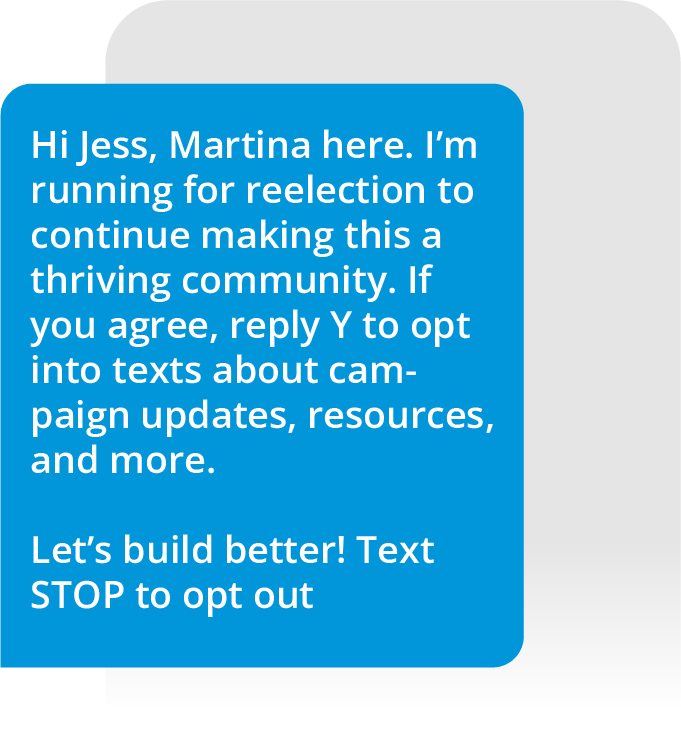
No matter how often you’ve been around the campaign block, you need to announce your campaign to let voters know you’re running. With these messages, stick to the basics: your name, what position you’re running for, and why.
The why is especially important for new contacts. If you’re reaching out as the first step in your textbanking strategy, give them a reason not to opt out of your contact list. Announcement messages should drum up excitement about the upcoming campaign and candidacy.
#2
Fundraising Message Example
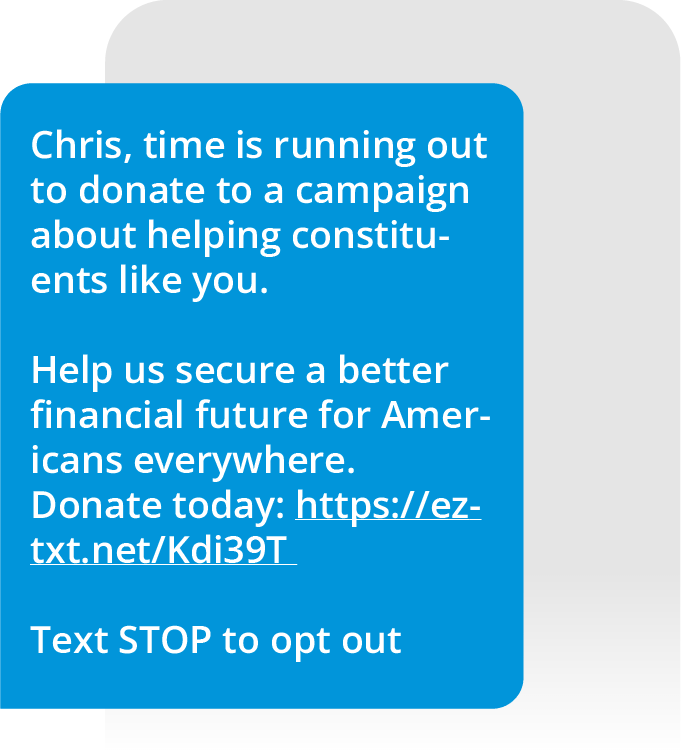
Political campaigns can’t thrive without donations, and this is where the power of SMS texts comes into play. By sending fundraising text messages, you’ll be able to reach your audience quickly and make it super easy for them to donate. You can also use text-to-donate fundraising.
Fundraising messages should have a sense of urgency, appeal to emotions, and provide a clear benefit. You could also consider suggesting a donation amount to give your contacts clear parameters to work with (but this tactic should probably only be used with smaller donation goals so that you don’t alienate those who can’t afford large financial gifts).
Don’t forget to send a follow-up thank you to everyone who donates.

#3
Volunteer Recruitment Message Example
Next in our political campaign message samples is recruiting volunteers, who are the lifeblood of any campaign. Mobilize supporters by asking them to volunteer. This is a great alternative for those who want to support your campaign but might not have the financial means to donate. Instead, they can donate their time.
#4
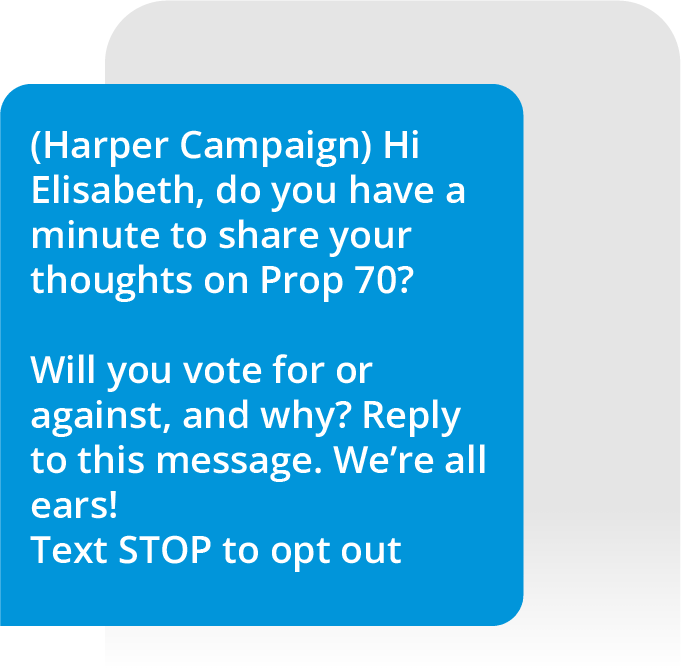
Asking for Feedback Example
Data is crucial for political campaigns, and one way to get more data is by asking contacts for their opinions and feedback via text. This benefits voters and campaigns: voters feel like their voice is heard, and campaigns gather more details to inform their political campaign outreach strategies. You can incorporate text-to-vote, send surveys, and even implement conversational texting.
#5
Campaign Updates/Information Example
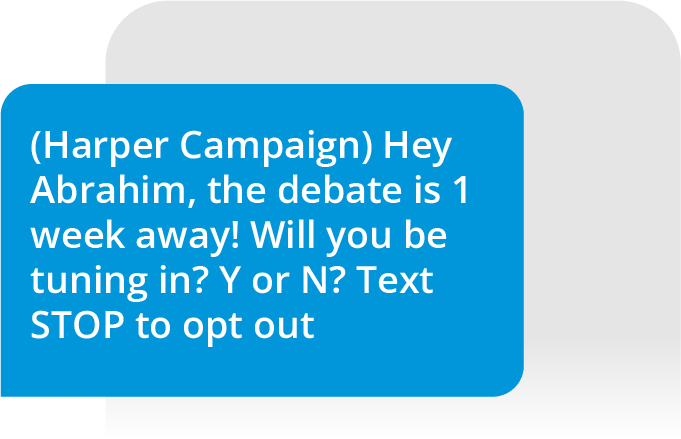
Effective political messages are those that engage voters frequently throughout the campaign. While you don’t want to bombard them with too many texts, you want to share updates and important information when needed. This could range from upcoming events to videos of a past rally to information that voters should know about, like new legislation or political hurdles.
#6
Persuasion Message Example
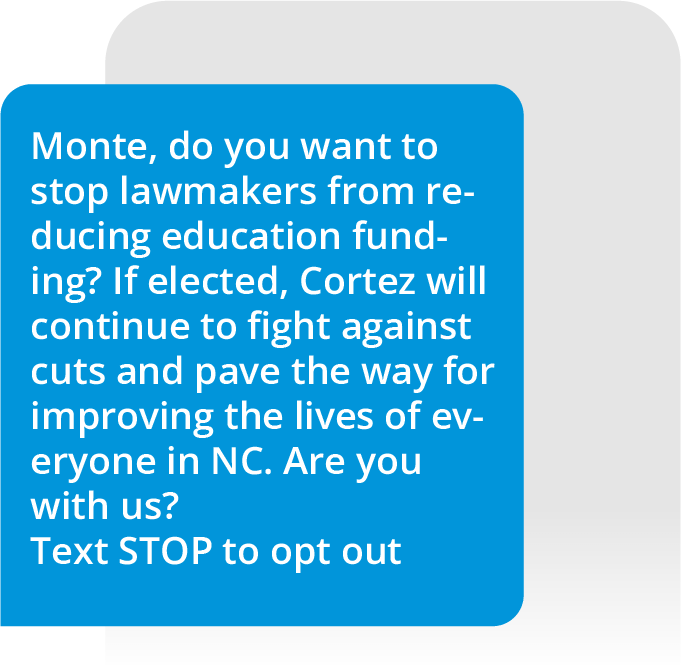
Persuading an audience to vote in a certain way is an important part of every campaign, whether you’re part of a political action committee or a candidate. While you might not want to send persuasion texts to already committed supporters, you will want to text swing voters or historically non-voters with messages that convey things like your values, stance on hot-button issues, and background. Persuasion messages can also highlight what other candidates are doing wrong or announce high-profile endorsements to sway voters.
#7
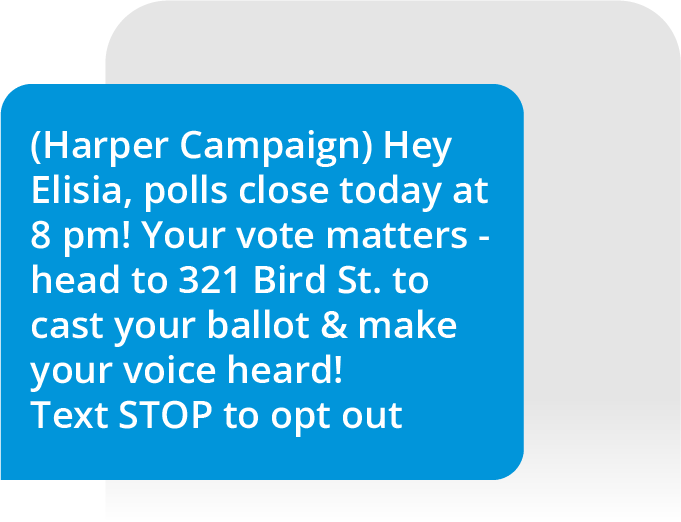
Get Out the Vote Example
SMS messages are effective channels for getting out the vote, or mobilizing people to participate in their election and cast their ballots. Align get-out-the-vote text messages with specific points in the voter journey, from prompting voter registration to sharing information about early voting to prepping voters for Election Day.
Check out more examples of political campaign messages that are proven to work for getting out the vote.
#8
Personalized Appeal Example
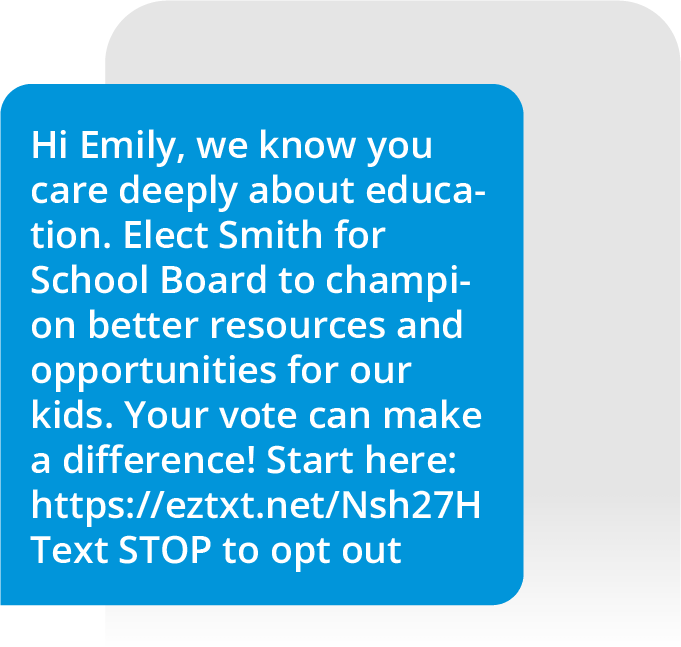
Last but not least is texting’s undoubted ability to help messaging resonate emotionally with supporters during your election cycle, with 98% open rates compared to other overcrowded communication channels like email or traditional mail. Tailoring messages that connect with recipients personally helps your platform address their concerns or interests directly.
Effortless Political Texting Starts Here
Every contact counts! Gather, segment, and reach them all year.
Tips for Crafting Messages that Speak to Your Audience
No matter what political campaign outreach messages you send, you must always employ the best practices for political texting — the top one is speaking to your audience. You can send texts at the right frequency, including the right links, and incorporate all the right SMS features, but if you’re not reaching voters with content they care about, your campaign might suffer.
So, you’re probably wondering, “How do I craft persuasive messages that resonate with my specific audience?” You can craft persuasive messages that resonate with your specific audience by personalizing and taking the right tone.
Personalize
When you personalize political messages, you’re essentially telling your constituents that they’re not just another vote — they’re real people with real needs that matter.
First, campaigns can use more straightforward information, like voter names and local references, to personalize political campaign messaging. Including a contact’s first name in every message is part of text marketing 101, but going further by mentioning local regions, neighborhoods, communities, and more, as well as issues they face, can go a long way in letting your audience know that you can meet them on the local level.
Next, campaigns can go deeper by leveraging data on voter demographics, voting behaviors, local interests and concerns, and so on. It’s important to tailor political messages to different age groups, types of voters (swing voters, low-propensity voters, supporters, etc.), and their specific interests. For example, when sending a fundraising text message, you might want to send slightly different messages to your various contact segments, incorporating content that will resonate with them.
If your next thought is, “How do I reach different generations like Millennials, Gen Z, or Boomers with my texting game?” we’ve got you covered. Learn how to reach different generations like Millennials, Gen Z, or Boomers, with your texting game with our article, Texting Across Generations: Reaching Voters of All Ages.
Take the Right Tone
Taking the right tone is key for any marketing message, especially for political campaign messaging. While using appropriate language and tone of voice for different age groups is important, make sure your campaign considers the impacts of positive versus negative tones.
Positive political campaign outreach serves to inspire and uplift. These types of messages usually focus on providing practical solutions and instilling hope. On the other hand, negative political messaging aims to inform by shedding light on problems with other candidates or issues.
Both positive and negative campaign messages can incite emotional responses that mobilize voters. Still, when used incorrectly, your campaign might appear aloof or insensitive. We’re not here to argue for or against “going positive” or “going negative” but rather to reiterate that your tone of voice matters when persuading voters.
From Text to Vote: Turning Engagement into Action
Our top political campaign message samples, paired with personalization and taking the right tone, will help to engage your audience. But you might wonder, “How do I convert engagement into votes?”
To convert engagement into votes, your campaign should send personalized messages at the right times, use your volunteer network, and provide helpful resources.
Send Personalized Messages at the Right Times
Personalization is key to reaching your audience (as discussed above), but you must send personalized messages at the right times to effectively engage and mobilize.
Consider where your voters are in their journeys with your campaign or the voting process in general. For example, have they just been introduced to you as a candidate? Then, it might not be time to ask for donations just yet. Consider informative messages first before sending fundraising appeals.
Similarly, you should be timing your get-out-the-vote messages to avoid bombarding your contacts. A well-timed message could be the difference between someone voting or staying at home.
Use Your Volunteer Network
Every political campaign needs volunteers to help make it successful. Volunteers do everything from stuffing envelopes to assisting with events. But they can also help you encourage people to vote, like following up with voters who have been texted by your campaign, either by canvassing out in the community or calling voters to discuss issues further. But you can also encourage your volunteer network to spread the word to their own contacts by texting, posting on social media, and word of mouth.
When you need more volunteers, look at our political campaign message sample above for volunteer recruitment.
Provide Resources
Personalizing messages and using your volunteer network to get the message out can motivate people to vote. However, the best way to turn engagement into votes is to provide tangible resources that make it easy for your contacts to drop their ballots. Here’s what you can do:
- Link to voter registration forms
- Share state-specific or local laws regarding voting processes
- Share polling places
- Provide info on transportation assistance options
Don’t overlook the power of the details when strategizing methods for engagement and action.
Measuring Success: Tracking the Impact of Your Mobile Outreach
Even if you send the most persuasive, mobilizing messages to your contacts, you may still wonder, “How do I know if my text messages are working?” To know if your text messages are working, you need to track their performance.
Of course, seeing how many people vote for your candidate or cause is the ultimate performance indicator, but you don’t want to wait until Election Day to determine if your messages were effective. Here’s what to do to track the impact of your political campaign outreach SMS efforts:
- Track click-through rates to see how many people engage with your texts and click links.
- Track response rates to determine engagement with conversational texting.
- Monitor donations, event RSVPs, volunteer sign-ups, and more to gauge the effectiveness of your calls to action.
- Conduct A/B testing to compare different message formats, calls to action, and verbiage and see what your audience segments resonate with the most.
- Analyze and adapt using insights from the previous actions to refine your SMS strategy and increase engagement and, ultimately, votes.
Avoiding the Spam Zone: Navigating Text Message Regulations
Ah, compliance — that super important but potentially overwhelming thing your political campaign needs attention to. Thankfully, we can clear up your questions regarding text message compliance.
So, if you’re thinking, “What are the rules for political text messaging so I don’t get flagged as spam?” stay here. The following are the rules for political text messaging so you don’t get flagged as spam.
Ask for Consent
The Telephone Consumer Protection Act requires that contacts provide express written consent to receive text messages from organizations. Whether your campaign acquires contacts through various sign-up methods or voter data files, you always need to ask for permission to send them SMS messages.
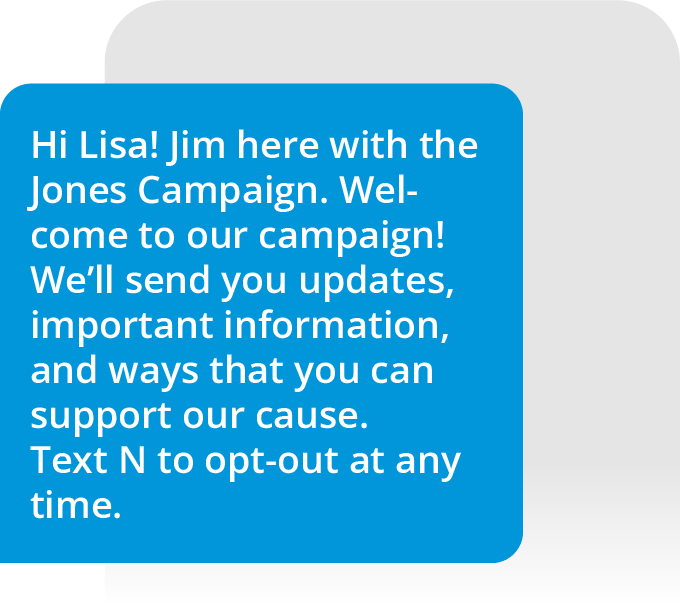
In addition, a best practice for the first message people receive after opting in is to tell them the messages they’ll receive from your campaign, like this: “Hi Lisa! Jim here with the Jones Campaign. Welcome to our campaign! We’ll send you updates, important information, and ways that you can support our cause. Text N to opt-out at any time.”
Provide a Way for Contacts to Opt Out
As you can see in our list of political campaign message samples at the beginning of this article, every text includes a way for the contact to opt-out. You might have thought that just receiving opt-in consent is sufficient, but you need to provide a way for your contacts to opt out of messages. And — this is important — if they opt out, you cannot send them any more political campaign messaging.
Clearly Identify Yourself
Your campaign should also identify itself in every message as an added form of legitimacy and security to give your contacts peace of mind. Identification methods can vary, like this “[Barber Campaign] Hi Jenn . . .” or like this “Hi Jenn, Ben Gomez here . . .” The important thing is that your contacts spend less time wondering who the text is from and more time reading, engaging, and mobilizing.
Register for A2P
A2P registration is a recently required approval process for businesses and organizations that send contacts text messages from 10DLC numbers. While you can learn everything about A2P and how to register in our guide, you need to know now that your campaign must gain A2P approval to comply and avoid fees. But don’t worry — your text marketing platform should help you with this process.
Learn How EZ Texting Helps Political Campaigns
While these political campaign message samples and additional info on crafting the best political texts will persuade, engage, and mobilize, you’ll need digital political campaign tools to help reach your audience. EZ Texting is your one-stop solution to all things text marketing. Start your free trial today to see for yourself!
Effortless Political Texting Starts Here
Every contact counts! Gather, segment, and reach them all year.
FAQs
You can ensure your text messages are inclusive and respectful by avoiding stereotypes, using inclusive language, and empathetically acknowledging specific concerns of your various voter segments. In all of your text campaigns, make sure that you’re considering your entire audience because representation matters.
Yes! A picture can be worth a thousand words in a text message, and so can videos. In your political campaign texts, consider including appropriate images and videos that are relevant to the topic to engage your audience. Image and video content can often do the talking for you.
This whole political texting thing is heading toward using more AI technologies, like chatbots, virtual assistants, workflow optimization, and more. Plus, campaigns might begin engaging voters through virtual- and augmented-reality experiences.
See other resources related to:

